For the past few weeks, anyone who’s spoken to me and Adam for more than 15 minutes has probably heard about our big Planet of the Apes binge, which is that from late April through May, we watched the original 5 Apes films (1968-1973) and the 4 movies from the reboot series (2011-present).1
I’ve always been a fan of the original ‘68 film and the reboots, which I remembered fondly going into this, but I was hesitant about the 70s run when Adam chucked on Beneath the Planet of the Apes (more on that in a second..). I can now say with confidence—this is one of the great sci-fi franchises and one of the most consistent in quality. Also, EVERYBODY wants to see a chimpanzee walk around and wear an outfit and talk and especially ride horses and carry guns. Did you know these movies all make bank? Beneath made 7.6 times its budget back. Dawn made $710 million. As always, I have absolutely no finger on the pulse because I didn’t think “4th film in the talking apes series, but this one doesn’t have Andy Serkis as our friend Caesar anymore because it’s set hundreds of years after the last one” had much widespread appeal, but it is in fact the hit of the summer so far. I didn’t love Kingdom (more on that too), but I want a thousand more of these movies. What I’d really like is to eventually get to an original concept for the first film, long abandoned—Apes living in a truly FUTURISTIC society.2
After our binge, my heart landed on what I think is a “wrong” ranking but it’s my truth!! I generally try not to spoil too much in this ranking, but it DOES functionally spoil the Big Twist of the original Planet of the Apes, so don’t read ahead if you want to go into that blind (and you should if you can!):
Beneath the Planet of the Apes (1970) dir. Ted Post — It feels a bit unfair to rank Beneath last because it’s got a lot of exciting stuff—a demonstration of anti-war apes carrying signs like “Don’t Vote for War!”, a walking tour of the now subterranean ruins of New York City that strongly implies our protagonist Brent walks from Queens to Wall Street then back UP to Midtown, and a daringly bleak ending that had us yelling (it’s the biggest bummer end in the series, which I don’t say lightly). Unfortunately none of this was enough to make the “Charlton Heston look-a-like lands on Earth unwittingly, meets the same characters & realizes all the same things Heston did last time” retread less frustrating and I really hated the underground nuclear-worshipping cult of psychics. I know that phrase is going to sound fun to you and it is funny, on paper, that they’re all dressed like sperms, but I assure you, they’re not even remotely as interesting as they should be!
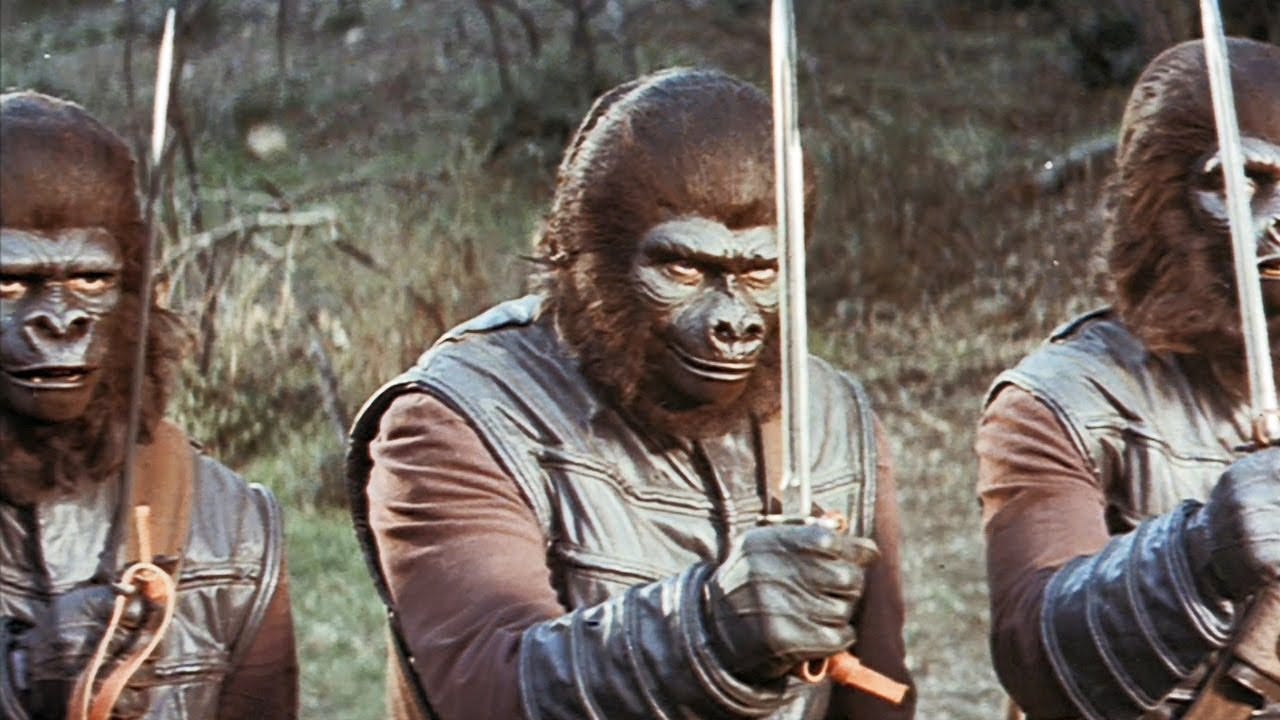
Battle for the Planet of the Apes (1973) dir. J. Lee Thompson — Battle, the last in the original Apes franchise, is, frankly a total snooze about the philosophical underpinnings of a budding, post-apocalyptic ape/human society, but I’m giving it this slot for not pissing me off. I also like Battle because I care a lot about Caesar, the leader of the apes and the son of Dr. Zira and Dr. Cornelius (more on them later) and I don’t care at all about Budget Charlton Heston (“Brent”) from Beneath. I think Battle’s also a worthwhile watch for how deeply it influenced the 2010s reboots, particularly the two Matt Reeves movies—this is where we get “ape shall never kill ape” as a fundamental ethos of ape society.
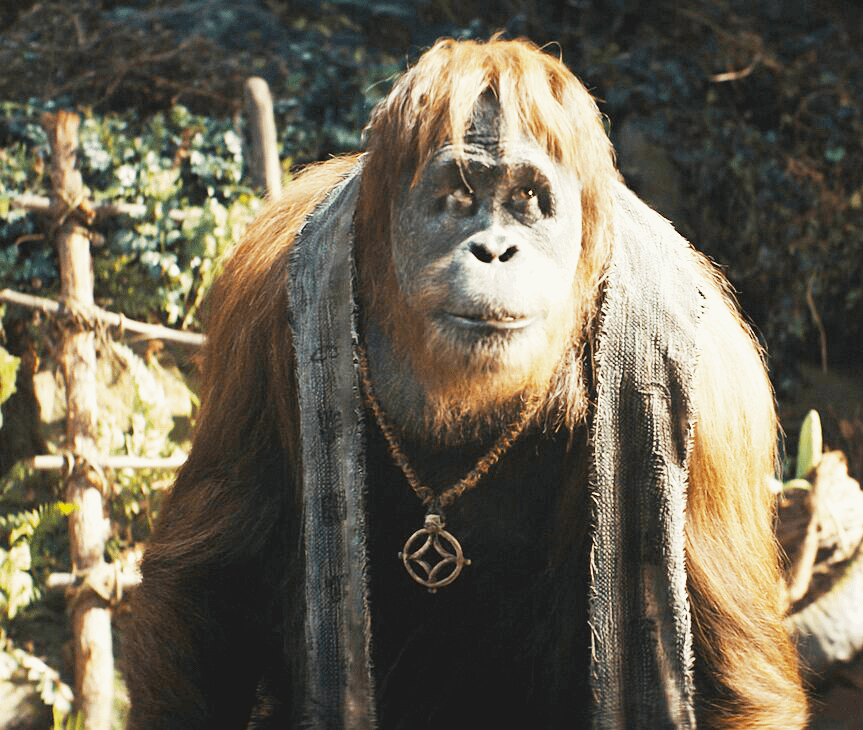
Kingdom of the Planet of the Apes (2024) dir. Wes Ball — I had really high hopes for this movie, but this franchise needs to let humans go. Forget about them!!!! This is the PLANET OF THE APES now! The conceit of Kingdom was that it would leap many generations past the time of Caesar (and the human apocalypse) to focus on a conflict between ape societies. Instead this movie walks back on the promise of War’s final moments (the dawn of the age of apes! the end of the age of man!) and sprinkles in a feral-ish human girl with Instagram face who might just be smarter than the others into the conflict between Noa, a young ape from a peaceful village of chimpanzee birders, and Proximus Caesar, a Vonnegut-loving empire builder who dreams of acquiring human technology. Despite being the longest film in the entire franchise, Kingdom doesn’t take the time it needs to explore its many cool ideas (or to simply hang out with great new character, Raka the Caesar-and-peace-loving orangutan), choosing instead to root its final moments in the story of humans. I cannot say enough: I am here for apes! I also do not come to the Apes franchise for optimism.
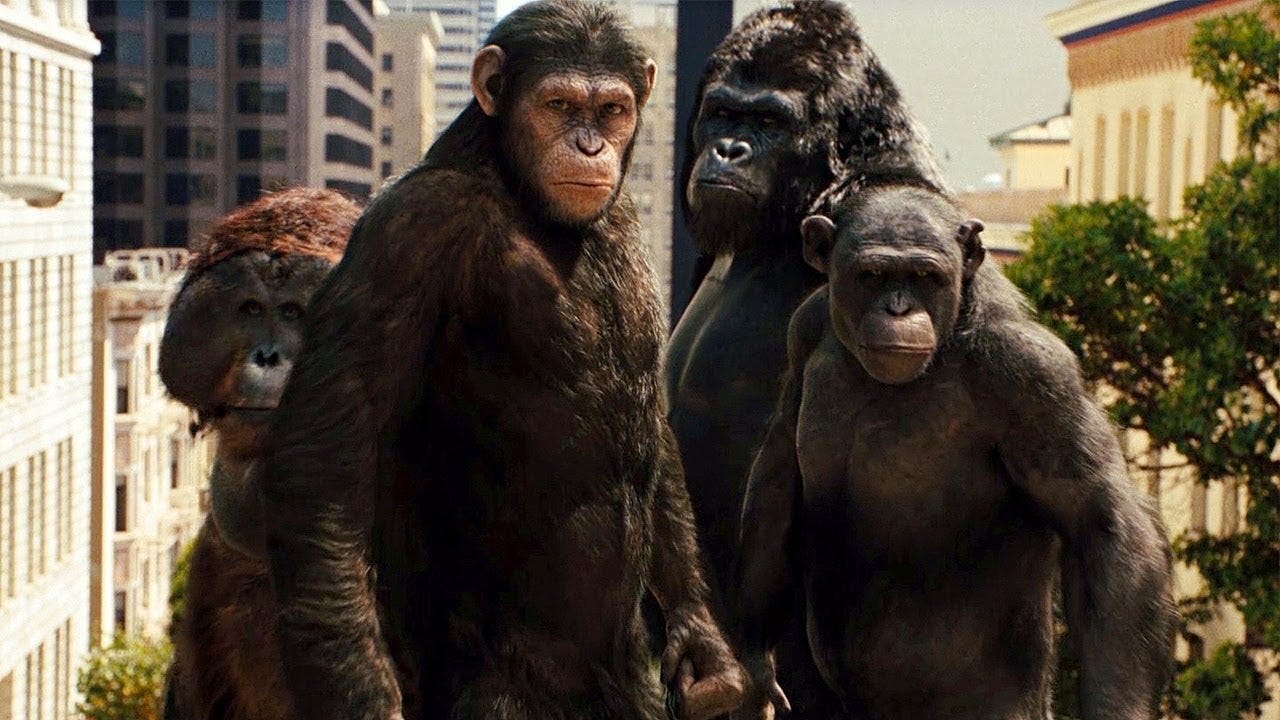
Rise of the Planet of the Apes (2011) dir. Rupert Wyatt — From here on out, all of the movies are baseline good. Rise tells a pretty solid and efficient story—the transformation of Caesar, a human-raised lab chimp whose exposure to a viral drug has given him greater intelligence, from glorified pet to leader of the apes. I’ll say this now: Caesar is one of the greatest characters, with one of the greatest character arcs, of…ever? The only thing strictly wrong with Rise is that James Franco, as Caesar’s human “father,” is dreadful and Freida Pinto as his veterinarian girlfriend is not much better. He’s almost ruinously bad in this and there’s a lot of him. However, the final escape of Caesar and the apes from an animal control facility/prison into Muir Woods, everything from Caesar speaking for the first time (“No!”) to the stand-off with cops on the Golden Gate Bridge is classic hoot-and-holler fare, and maybe my 2nd favorite individual scene across the whole series. I’d also argue Rise has one of the happier endings in the whole franchise, even though the credits chart the spread of a deadly virus across the globe that will destroy the human race.
War for the Planet of the Apes (2017) dir. Matt Reeves — War sandwiches a somewhat uninspiring, Colonel Kurtz knock-off human antagonist and a cast of uncompelling new sidekicks between a truly astonishing opening battle sequence and a gorgeous, elegiac ending which serves as an appropriate sendoff to Caesar and a brave departure from the presence of humans (or so I hoped!). War also retreads Rise ground with another prison break finale but once again, it’s enjoyable! Caesar is really good at planning and executing prison escapes.
Planet of the Apes (1968) dir. Franklin J. Schaffner — I appreciate that this placement is lightly sacrilegious and to be clear, I love this movie! It kind of plays like an all-time great Twilight Zone episode, not least because Rod Serling wrote the original script, and his iconic twist ending was maintained. It’s mean, cerebral and deliberately paced with a fantastic Jerry Goldsmith score —I’d forgotten it takes 34 full minutes to even reveal that this is a planet of apes since before that it’s mostly Heston & company wandering through Arizona desert. I find this both clever/patient and mildly frustrating to me, a viewer who already knows this is a planet of apes and kind of just wants to get on with it and meet my friends Zira and Cornelius, the ape doctors who want to lobotomize Taylor (for science!) until they realize he’s intelligent, at which point they become his friend and passionate advocate. Sweetie pies!
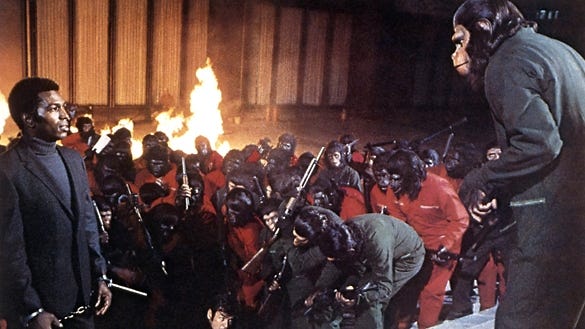
Conquest of the Planet of the Apes (1972) dir. J. Lee Thompson — Conquest cost about 1/3rd of the budget of the original film and you can tell, but after about ten seconds of watching groups of apes doing chores around Century City, overseen by some distinctly fascist prison guards, all set to a thumpy jazz score I don’t really care. What I like about Conquest is how lean and clean it is—Caesar (here, he’s the natural born son of time-traveling intelligent apes from the future… more on that in a second) goes to the city, learns the apes live as slaves3, is forced into slavery himself (he’s first sent to “conditioning” where apes are violently trained to be able to work in human environments4) and leads an ape revolution, a spectacular 20 minute sequence in which a small army of apes overthrow their human captor and set fire to the shadowy city, complete with some incredible short tracking shots. It reminds me a lot of the prison break in Andor, if that persuades.
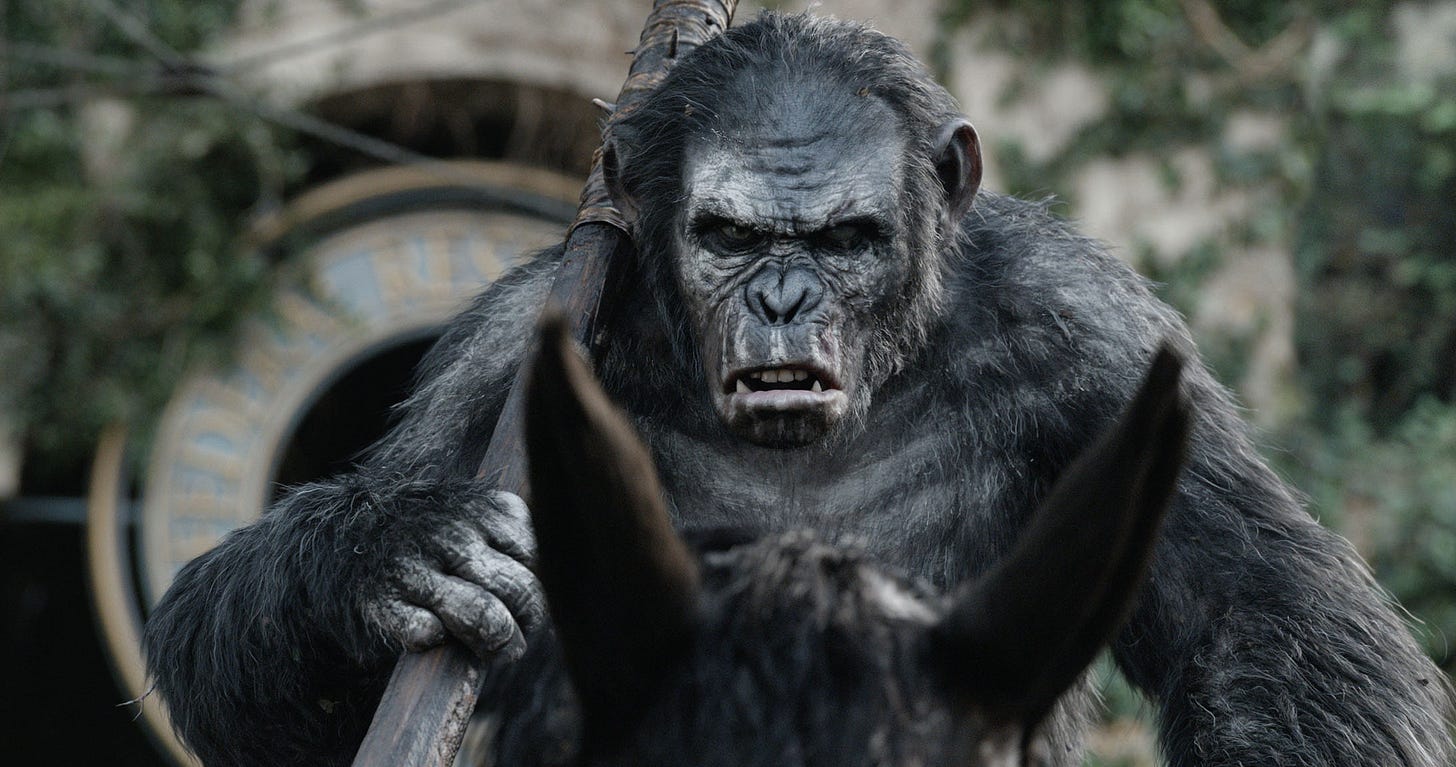
Dawn of the Planet of the Apes dir. Matt Reeves — Probably formally speaking the best Apes film (but ultimately too serious to receive my top slot), Dawn ranks high because it focuses its primary attention on the apes while also having the best human characters in the series since Heston5, thanks to Jason Clarke, Keri Russell and Gary Oldman (sorry), being competent actors. The various thorny allegiances and goals of the characters in Dawn are well drawn—the humans are desperate and traumatized, wary of apes after the “Simian Flu” killed their loved ones and ended their world. Clarke and Russell are outliers, playing human mirrors of the open-minded tolerance of Zira and Cornelius. Meanwhile, Caesar’s peaceful, cautious nature is opposed by Koba, a bonobo he freed from human labs who is torn between his desire for vengeance and his loyalty to Caesar. Also, there’s a scene where Caesar goes back to San Francisco and revisits his old home that made me bawl. In the grand Apes tradition, Dawn has a fabulously bleak ending, although it does allow for a tragic glimmer of hope in the form of a handful of humans and apes who were willing but unable to forge a better world.
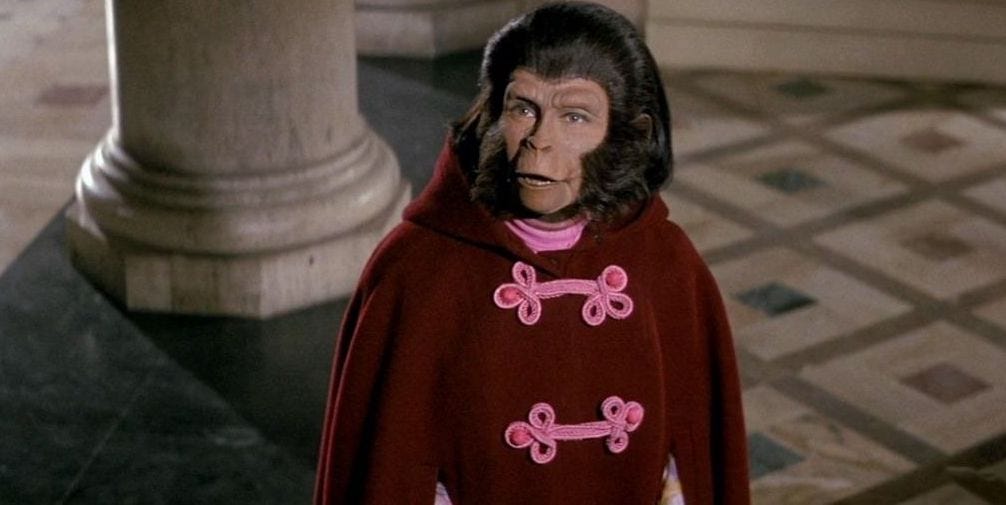
Escape from the Planet of the Apes (1971) dir. Don Taylor — It doesn’t get better than this! Or so I shall argue. Escape has one of the most thrilling openings Adam and I have ever experienced together. A spaceship crashes onto a beach and is greeted by human military. Two figures in space suits emerge and take off their helmets and reveal themselves to be…apes! Not just any apes, but our friends Zira and Cornelius. They’ve time traveled from the war-torn, ape-run future to 1970s Los Angeles and after a short stint in the LA Zoo, Zira (a first class yapper) outs their ability to speak and the ape couple become celebrities. They’re put up in a fancy hotel and go shopping for new outfits and give talks. Escape is my favorite for a few reasons: I like the colorful, gleeful insanity of “two talking apes become famous in 70s LA.” I love Zira and Cornelius, who are thoroughly decent, charming and very much in love. Zira is a firecracker who consistently gets them into trouble with authority and Cornelius is more nervous and conservative, but he loves her! Finally, after all that fun and after building up so much audience affection for its starring apes, Escape isn’t afraid to commit to a completely distressing final 10 minutes which doesn’t shy away from seeing its story through to a terrible, logical conclusion.
If one Apes tradition is to end each film as depressingly as possible, the other is a long history of brilliant performances by human actors who are able to imbue either rubber-masked simians (as Roddy McDowall and Kim Hunter do) or mo-cap creations (who else but Andy Serkis!) with enormous feeling and… well, I can’t say humanity, can I?
We skipped the Burton. Adam’s been lobbying in favor of watching it, and I feel that this would be a genuine waste of my time, of which I only have so much.
Wikipedia says the apes were originally meant to live in a far more advanced society before Schaffner (and Michael Wilson who rewrote much of Rod Serling’s original script) decided to make them a lot more primitive, because it was cheaper. I think this ends up working with the kind of backwards, ape creationist society Taylor finds himself in but it could’ve been so COOL.
In the original series, there’s this insane backstory where there was a pandemic that only killed cats and dogs and humans simply couldn’t live without pets (cannot relate) so they started buying apes as pets until they realized apes were pretty good at human chores, at which point they became a slave class. I love this movie, but admittedly “hubristic scientific tinkering” and “global pandemic” make a little more sense to me.
There’s one where apes are thrown in a room with strobe lights so they can work in the club. :(
I’ll also give a shout to Ricardo Montalban as the kindly circus owner who hides and raises Caesar in Conquest. He’s a very warm presence!









this is incomplete until you do the burton sorry to side w adam